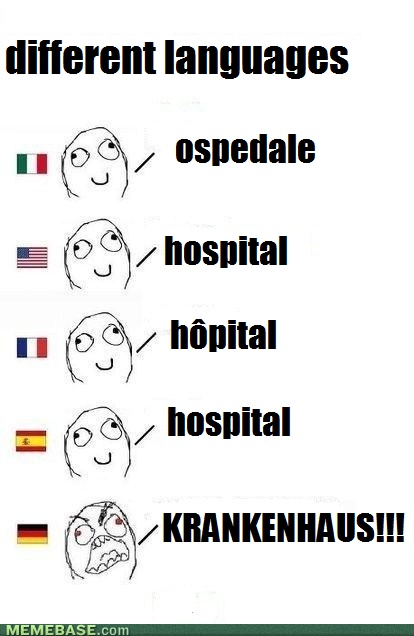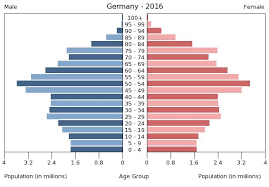1.4 Kommunikation und Wirtschaftliche Herausforderungen
2 min read•june 18, 2024
K
kiera_kelly
AP German 🇩🇪
29 resourcesSee Units
Communication Norms
As you probably already know, German can sometimes seem like a very harsh language. There are plenty of memes about how harsh the language can sound (see below). That has also adapted itself to the social norms of how people communicate in Germany.

image courtesy of pinimg
German people tend to be very direct and to the point. There is no beating around the bush. You speak your mind and it's considered rude when you don't tell someone what you're thinking.
Small talk between Germans is also not very common. When you spend time with someone German, you get to the point and speak about important matters, not so much about the weather.
It's common to say "Guten Morgen" or "Guten Tag" when passing someone in the street, or when entering a store, but small talk beyond that is not normal.
Non-verbal cues play a large role too, for example, if you interrupt someone while they are speaking, it's considered very rude and offensive. So just remember to always let someone finish speaking before adding to the conversation.
Where is German spoken exactly?
German is spoken in many parts of Europe and is the official language of Germany, Austria, and parts of Switzerland. Many people in other countries, such as Liechtenstein, Luxembourg, Belgium, Italy, and the Czech Republic, speak German as well.
Economic Issues
- Aging Population and Declining workforce
- Germany is one of the few countries in stage 5 of the DTM, meaning not as many children are being born, so the workforce is declining as people get older.

- High levels of public debt
- A lot of this is due to increasing their military spending (in accordance with NATO), reparations from reunifying the East and the West, and EU policies.
- Slow progress on structural reforms
- Unequal distribution of wealth and income
- Growing competition from low-cost countries (in manufacturing)
- Trade tensions (with the US)
- A lot of the tensions rise because Germany is being criticized for not opening enough of its market to the US, its tax policies, and its strong data privacy laws
- Climate change and transition to a low-carbon economy
- Using a lot of renewable energy sources
- Electric vehicles are greatly being promoted
- Integration of refugees into the labor markets
Economic Policies:
- Labor market reforms to increase flexibility and competitiveness.
- Investment in education, research, and development to increase productivity.
- Promoting innovation and entrepreneurship.
- Encouraging immigration and integration of refugees into the labor market.
- Encouraging green investment and transition to a low-carbon economy.
- Investment in infrastructure, including digital infrastructure.
- Reforms to the healthcare system to improve efficiency and reduce costs.
- Encouraging savings and pension reform to prepare for an aging population.
- Promoting free trade and maintaining strong international economic relationships
Browse Study Guides By Unit
👨👩👧Unit 1 – Families in Germany
🗣Unit 2 – Language & Culture in Germany
🎨Unit 3 – Beauty & Art in Germany
🔬Unit 4 – Science & Technology in Germany
🏠Unit 5 – Quality of Life in Germany
🌪Unit 6 – Challenges in Germany
📚Study Tools
🧐Exam Skills

Fiveable
Resources
© 2025 Fiveable Inc. All rights reserved.